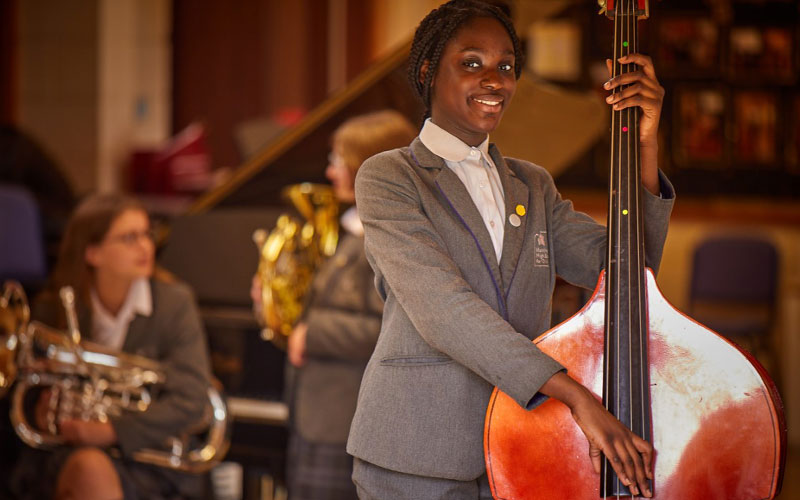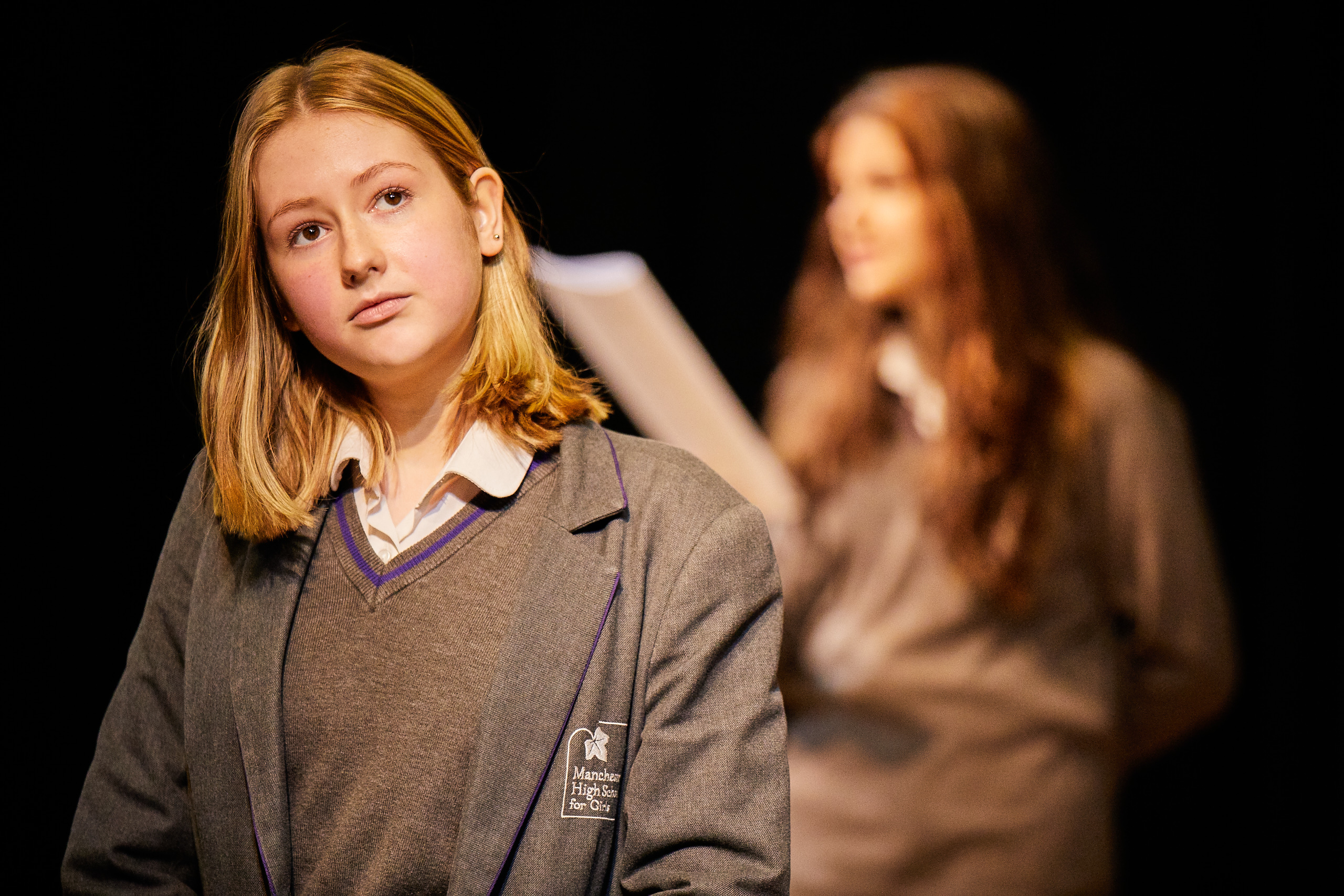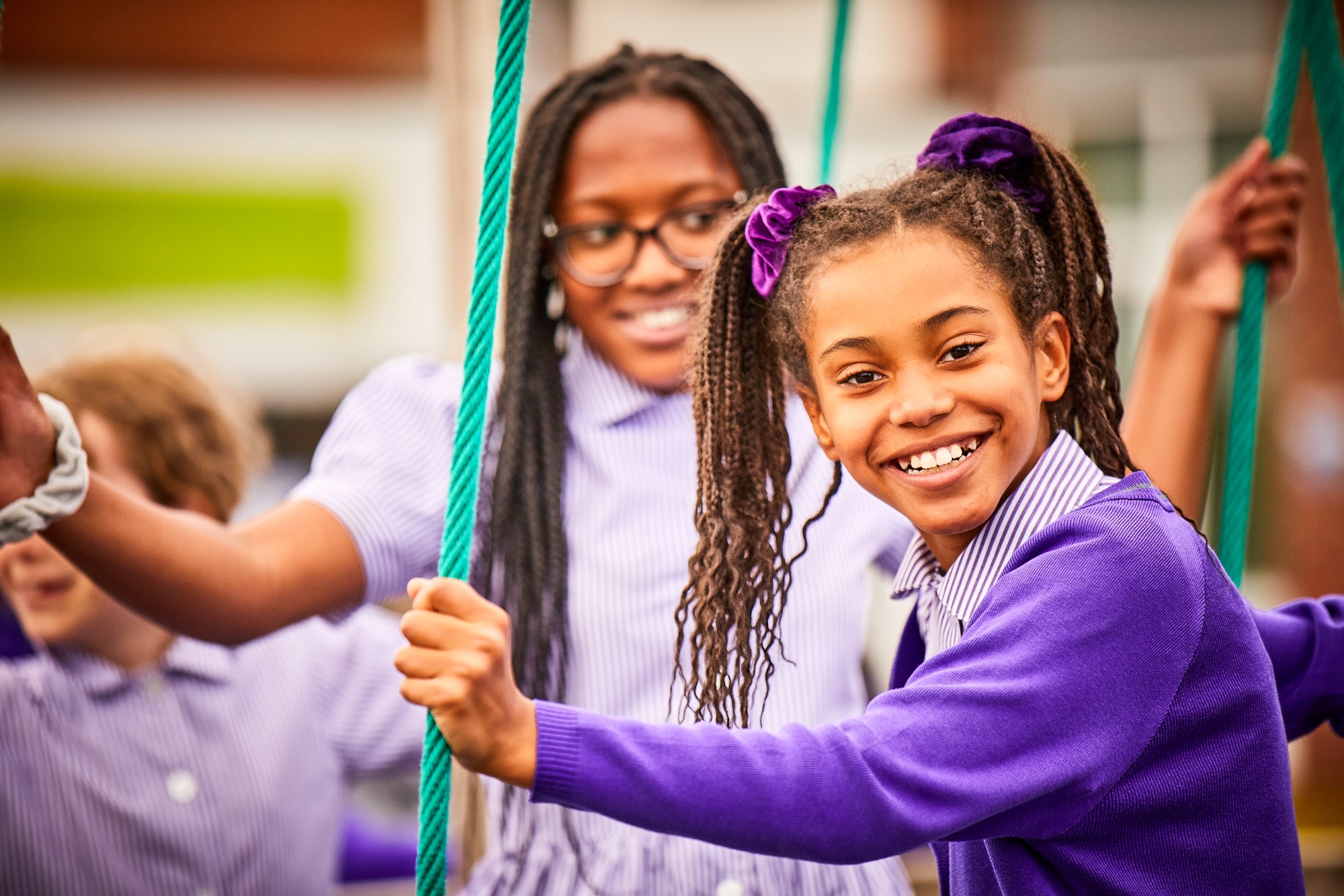The Heads' Blog
The Heads' Blog
Please read on for the latest essays and thought pieces from Mrs Helen F Jeys (Head Mistress) and Mrs Samantha Gibbons (Head of Preparatory School).
To jump to a particular entry, please click on the links below:
Beauty Influencers, Drunk Elephant and the Wild West that is TikTok - Mrs Samantha Gibbons
Are Girls Losing Ground? - Mrs Helen Jeys
The Vital Importance of Girls' Education: Manchester High School for Girls at 150 - Mrs Helen Jeys
The Impact of Early Smartphone Exposure on the Mental Health of Young People - Mrs Samantha Gibbons
Beauty Influencers, Drunk Elephant and the Wild West that is TikTok - Mrs Samantha Gibbons

This summer, our Year 5 girls travelled to the Lake District on their residential. After a very busy day outdoors, their teacher asked them to brush their teeth and head to bed. Instead, three or four of them asked, very politely, (because our girls are always polite), when could they fit in their beauty routine? With them they had vanity cases full of skincare products.
The British Beauty Council valued the UK beauty industry at £27 billion in 2023 (around $500 billion globally). Though only half the size of fashion, beauty is one of the fastest-growing consumer industries, resilient, despite economic challenges, and driven by online purchasing, wellness culture, and the exponential rise of beauty influencers.
Platforms like YouTube, Instagram, and TikTok flood feeds with influencers showing off radiant, “perfect” skin. For tweens (mainly girls) between eight and twelve, it seems that they are being indoctrinated by the sheer volume of posts into thinking that without these products they will not be able to ward off the ageing process. At a stage when identity and self-worth are still forming, they are exposed to the idea that they must start fighting ageing before it even begins. Filters, editing, and relentless ‘influencing’ fuel an unattainable cycle of comparison. They are at an age when they are transitioning from childhood to adolescence, a particularly vulnerable stage in how they see themselves.
We adults know how social media works: it creates a problem before selling us the solution: You should look like this. You should be this lean. Buy these products. Follow this fitness regime. Do these things and you will be happier, you will be healthier, people will like you more, and you will have more friends.
As adults, we might think we see through it, but even we are part of the system. Our online interactions generate valuable data that fuels these industries. Seeing ourselves as products in this supply chain might be a perspective we have not considered before and seeing how our children are being manipulated in this way is a sobering thought. As Kaitlyn Regehr argues in Smartphone Nation, understanding how our data is used, and teaching our children to do the same, is key to reclaiming control over our digital lives.
To see how this plays out in practice, I downloaded TikTok this summer. Within minutes of searching for young beauty influencers my feed was saturated with “Get Ready With Me” (GRWM) videos—young girls, some of them as young as 4 or 5 showing off skincare routines built around brands like Drunk Elephant, “to stop the wrinkles- like the old people have”. Some of these girls speak to the camera and showcase their routines like professionals! Perhaps the most concerning of all was a three-year-old who repeatedly parroted the word “skincare” while her mother sat behind her and explained how she goes about her beauty routine. At the other end of the spectrum, teenagers parody younger children, poking fun at their videos, or carefully made-up dermatologists warn against using these products (some of which contain retinol) while simultaneously recommending a whole host of “safer” products. It truly feels like the wild west. It worries me that when the wrinkles do inevitably come, there will be all manner of new influencers showing them how to deal with this – non-surgical ‘tweaks’ before the inevitability of other invasive techniques.
The routines are elaborate. Cleansers, serums, treatments, moisturisers, eye creams, lip balms, bronzers, sunscreen—seven steps or more, night and day. It feels very much like a cult where loyalty develops through playful product names such as “O-Bloos Rosi Drops” and “Pekee Bar,” creating an in-group language that excludes adults and bonds children. Indeed, Chloe Combi the co-founder of the Respect Project and expert on Gen A-Z calls this, “The Church of Drunk Elephant, where only the truly faithful are welcome.”
Add to this the financial cost which is eye-watering. A single Drunk Elephant “Babyfacial” sells for around £65. Girls now ask for skincare instead of traditional birthday or Christmas presents, hoping to expand their collections. In schools, children compare products and share photos of their curated ranges. Even those not on TikTok are aware of the trend because the virtual world has a habit of bleeding into the playground. The rise of “Sephora Girls”, tweens obsessed with skincare shopping trips, shows how retailers now deliberately target ever-younger audiences with immersive, sweet-shop-style environments, where children can try products before they buy them.
Of course, these products and routines are unnecessary. Children don’t have wrinkles, blemishes, or enlarged pores. Dermatologists agree that a simple, inexpensive cleanser, moisturiser, and sunscreen are all they need. Yet, despite this, the marketing and the ‘influencing’ works. My eight-year-old niece told me she loves Drunk Elephant because her friends have it, it looks nice, and it makes her skin “healthy.” Her fifteen-year-old cousin is more dismissive; her peer group has moved on to simple skincare but are much more into makeup. For the younger girls, though, branding and belonging are powerful forces. Perhaps for my 15 niece the cycle begins again with make-up.
Why does this matter? Superficially these are young girls having fun. However, they could actually be causing damage to their skin. Exposure to unrealistic beauty standards over time can have profound consequences: low self-esteem, dissatisfaction, anxiety, disordered eating, and depression. Constant comparison erodes self-acceptance and resilience, and it is starting younger and younger.
If we, the adults in the room, are to empower our girls, tool them up for the future and mitigate the effects of this phenomenon we must talk to girls about self-acceptance, authenticity, and the difference between marketing and reality. This experience has further compounded by view that delaying social media access until the teenage years is vital. Otherwise, children are handed a digital world they are not yet equipped to navigate.
This is not just speculation. A recent BBC News piece reported that while girls still outperform boys at GCSEs, the gap is narrowing, with girls’ overall performance declining since Covid. The Education Policy Institute linked this to worsening mental health, poor sleep, and social media exposure. The Smartphone Free Childhood movement argues persuasively that delaying phone use protects children’s wellbeing and now influential celebrities such as Robbie Williams and Kate Winslet have pledged to hold out as long as possible before giving their children smartphones. In the Preparatory School, we advocate the same principles.
Having dived into TikTok myself, I saw just how relentless the stream of “beauty” content is.
In the Prep School, we are already taking active steps to counter the effects of online pressures. We proudly support the Smartphone Free Childhood movement and fully support the principles which underpin the movement. We are very screen aware. Tablets and laptops are used judiciously and we continue to keep parents informed through thought leadership pieces and curated links in the Bulletin. Within school, we actively promote engagement in rich offline experiences – from sport, music and art to the Discovery Passport and the joy of being outdoors – ensuring our girls develop a strong sense of identity beyond the screen. And yet, we are conscious there is always more we can do.
Ultimately, the most powerful message we can give our girls is that beauty lies not in filters, followers, or fleeting trends, but in authenticity and self-acceptance. By equipping them with the tools to question curated images, understand the difference between marketing and reality, and see through the illusion of perfection, we help them embrace their individuality with confidence. The wrinkles, imperfections, and laughter lines that will one day appear are not flaws to be erased but symbols of joy, wisdom, and a life well lived. True beauty rests in being unapologetically oneself – and that is a message worth celebrating.
Are Girls Losing Ground? - Mrs Helen Jeys
I read Hazel Shearing’s BBC report on this year’s GCSE and A-level results with great interest. As she highlighted, girls remain more likely to pass their GCSEs than boys – 70.5% of girls’ grades were at 4/C or above compared to 64.3% of boys. Yet what is new this year is the narrowing of the gender gap: girls’ pass rates fell while boys’ rose, leaving the narrowest gap ever recorded. At A-level, boys are also leading in top grades, overturning the 0.4% advantage girls held last year.
It is striking too that boys make up 63% of entries for the UK’s most popular A-level, Mathematics, with proportionally fewer girls now taking the subject than in 2019. This matters. Maths opens doors to some of the most competitive and lucrative careers, yet fewer girls are even stepping up to the threshold.
Some argue that fluctuations are natural and we should avoid overreaction. But, as Natalie Perera of the Education Policy Institute think tank rightly warns, “we do need to start looking at what’s driving the decline in girls’ attainment before it gets too late.”
The statistics on attendance should also concern us. Last year, 21.9% of girls were persistently absent from school in England compared with 20.3% of boys. Add to this the disproportionate impact of social media on girls’ wellbeing – as noted by UCL’s Dr Jennie Golding, who calls for greater emphasis on belonging and emotional security – and the risks for girls are clear.
This decline must also be seen against the backdrop of dozens of independent girls’ school closures and mergers, accelerated by the Labour government’s VAT policy. These are schools with a proud legacy of championing gender equality and providing environments in which girls thrive.
The evidence for their impact is compelling. Research by the Girls Schools’ Association shows that pupils in girls-only sixth forms are significantly more likely to study mathematics and sciences at A-level than their peers in co-educational settings – 83% more likely to take Chemistry and nearly three times more likely to pursue Further Mathematics. The effect continues into higher education: girls from single-sex schools are four times more likely to apply for mathematics degrees and 40% more likely to apply for engineering degrees.
Why does this matter? Because STEM skills are critical to the UK economy. A lack of female participation in STEM (currently making up only 8% of the overall STEM workforce) not only limits opportunities for young women but also starves the country of half its potential innovators, engineers, scientists, and problem-solvers. McKinsey estimates that advancing gender equality could add £150 billion to the UK economy by 2030. We simply cannot afford for girls to step back just as the economy needs them most.
Crucially, single-sex education is not just about academic achievement. New research indicates that girls in girls’ schools report higher confidence and greater emotional resilience than those in co-educational schools. As Donna Stevens, Chief Executive of the Girls’ Schools Association, observes:
“This is a fascinating insight into the environmental impact of a single-sex school on girls’ confidence and emotional resilience and may well explain why girls in girls’ schools typically tend to do better academically and are more likely to choose STEM subjects.”
Against a backdrop of social media toxicity, unrealistic beauty standards and a shifting educational picture, young women face mounting challenges. Schools of all types must act – with clear strategies to nurture resilience, confidence, and ambition. But girls’ schools, with their explicit focus on girls’ wellbeing and their rejection of the notion that any subject is “for boys,” are uniquely placed to respond.
We cannot afford to let these institutions disappear. As Hillary Clinton once said:
“Women are the largest untapped reservoir of talent in the world.”
We must not allow that reservoir to become an ocean.
As I begin my role as President Elect of the Girls School Association, I’m committed to understanding what more schools should – both co-ed and single-sex – be doing to ensure girls don’t lose vital ground.
The Vital Importance of Girls' Education: Manchester High School for Girls at 150 - Mrs Helen Jeys
.jpg)
In my first September assembly, I share my summer reading with our pupils. The summer break provides me with the chance to read, reflect, and consider how the thoughts of leaders, educators, and peers impact our school's future strategy.
This year, I returned to my Deputy Head (Teaching & Learning) who excited recommended 'The Authority Gap' by Mary Ann Sieghart. Having heard Sieghart speak at a conference, I was captivated by her research-based insights and her dedication to empowering girls to reach their potential. Sieghart delves into the "authority gap," which highlights how women continue to face undermining and lack of recognition in public and professional spheres, often due to unconscious biases.
Sieghart's research reveals unsettling findings, including a study from the US showing that boys in elementary and middle schools receive eight times more attention from teachers. Boys are rewarded for assertiveness, while girls are praised for being orderly and quiet. This pattern contributes to girls losing their voices, confidence, and ambition.

Despite these challenges, Sieghart remains optimistic, advocating for greater representation and careful language use around young people to drive change. Her insights on the classroom reinforced my belief in the value of girls' and single-sex education.
Parents often ask me about the benefits of girls' education, a topic I discuss frequently. I share my classroom anecdotes, as well as statistics from the Girls' Schools Association (GSA), of which we are a proud member. The GSA emphasizes that girls' schools eliminate gender-biased expectations, allowing intellectual and physical confidence to flourish. Every girl can become a leader, develop resilience, and build self-confidence, positioning them well for university, work, and life.
Research, such as that by the Institute of Physics, shows that girls in girls' schools are more likely to study subjects like Physics and excel academically. For instance, in 2019, GSA students achieved over twice the national average of the top A-Level grades.
I am a strong advocate for single-sex girls' schools, which is why I'm deeply concerned about the proposed 20% VAT increase on independent school fees by the Labour Party. This could force girls out of independent girls' schools and into state co-educational environments, which may set back the feminist cause and exacerbate gender inequalities.

Independent schools, like ours, rely primarily on parental fees; since they are lacking the historic endowments that some boys' schools enjoy. Manchester High was founded to provide for Manchester's daughters what was long provided without stint for its sons, but girls' schools like ours have fewer resources and often fewer established connections with alumnae.
While we are fortunate to have supportive alumnae, not all girls' schools are in the same position. Over the last 150 years, brilliant women have emerged from Manchester High, making a significant impact in various fields. I worry that the proposed policy could hinder girls from reaching their true potential.
Helen Wright urges us to move past stereotypes of girls' schools and recognize their positive impact. A walk through our school's corridors reveals engaged, ambitious pupils who are excited about their future. My hope is that Manchester High School for Girls continues to thrive and offer opportunities to girls for the next 150 years and beyond. I also hope that all girls across the country can access schools that empower them to thrive.
The Impact of Early Smartphone Exposure on the Mental Health of Young People

Those of us old enough to remember the 70s and 80s will recall the time when ‘fast food’ emerged in the US with the expansion of McDonalds and thereafter swept the world. More commonly referred to as ultra-processed food nowadays, we now have a much greater understanding of the science which has proven that the consumption of these products is associated with a higher risk of succumbing to many diseases. Dense with calories, convenient to use, highly palatable and perniciously addictive, we are all familiar with the temptation to eat these items and the consequential accelerating rates of obesity in the developed world. Furthermore, these products are manufactured by enormous organisations with an eye on profitability more than ‘genuine’ health and well-being. I use the word ‘genuine’ because some of the so called ‘health foods’ advertised ubiquitously, are amongst the worst offenders.
I think that there are many parallels to be drawn from the revolution in the way we eat, to the advent of smart technologies on the health of our young people. I do not mean to exclude adults from this assertion, but I am concerned with the education of young children, and this is where my focus lies. The advent of Smart technologies has, since its inception, been peddled by large corporations as super helpful, convenient and intuitively easy to use. We have been told that they can help us become more creative, smarter and faster. Tapping into our primitive brains and activating the dopamine system, the millions of applications and social media platforms at our disposal have created a compulsion which is very hard to resist, not unlike that triggered by ultra-processed food.
In today’s hyper-connected world, it is hard to imagine a life without smartphones and they are not going to go away. These devices have revolutionized the way we communicate, learn, and engage with the world. However, as parents, and educators, we must seriously consider the impact of early smartphone exposure on the mental health of young people. With growing research into the developmental and psychological effects of screen time, we are gaining insights into how early and excessive use of smartphones can influence the well-being of children as they approach adolescence. Understanding this impact is critical if we are to foster environments that promote healthy development.

The Rising Tide of Smartphone Use
It is not uncommon to see toddlers swiping through screens or staring at YouTube. This trend raises important questions about the long-term consequences for mental health, especially as children grow into adolescence, a period marked by significant emotional and psychological development.
A growing body of research indicates that the use of smartphones in early childhood can have a detrimental impact on mental well-being. These effects can manifest in a number of ways from increased anxiety and depression to difficulties in attention, self-regulation, and sleep patterns. The relationship between early smartphone exposure and these challenges is complex, often involving a range of social, emotional, and neurological factors.
Developmental Challenges and Emotional Regulation
One of the most concerning aspects of early smartphone exposure is its impact on emotional regulation. Emotional regulation is the ability to manage and respond to emotional experiences in an appropriate and balanced manner. This skill is critical for healthy interpersonal relationships and overall mental health. The area of the brain, which governs decision-making, impulse control, and emotional regulation, is still developing throughout childhood and adolescence.
When young children spend excessive time interacting with digital devices, they may become reliant on external stimuli for distraction or emotional comfort. Instead of learning how to manage emotions through interaction with caregivers, peers, or through self-reflection, they may turn to a device for instant gratification or escape.

Social Skills and Interpersonal Relationships
Another critical aspect of early development is the formation of social skills. Much of a child’s ability to engage with others, develop empathy, and build meaningful relationships is learned through face-to-face interactions with family, peers, and caregivers. When children spend too much time in front of screens, particularly smartphones, they miss out on these crucial social experiences. This can hinder their ability to form close relationships and engage in cooperative play, both of which are essential for healthy social development.
Anxiety, Depression, and the "Comparison Trap"
As children grow older and become more active on social media, the risks associated with early smartphone exposure evolve. Adolescents are particularly vulnerable to the negative effects of social media. These platforms often present an idealised version of life, where users showcase their best moments, achievements, and appearances. For young people, this can lead to feelings of inadequacy, anxiety, and low self-esteem as they compare their own lives to the seemingly perfect lives of others. Indeed, this aspect of social media disproportionately affects girls, who spend more time than their male peers using these platforms.
Striking a Balance: The Role of Schools and Families
While it is clear that early and excessive smartphone use can have detrimental effects on the mental health of young people, it is important to recognise that technology itself is not inherently harmful. Smartphones offer numerous educational benefits, providing access to information, fostering creativity, and facilitating communication. The key is finding a balance between healthy screen time and opportunities for real-world interaction, physical activity, and unstructured play.

At Manchester High School for Girls, we fully support the principles of the Smartphone Free Childhood Movement, which recommends delaying smartphone use, or at the very least, limiting exposure until the age of 14. Mobile phones of any sort are not permitted in the Preparatory School, but for those girls who need to be contacted while travelling, we advocate the use of 'brick phones' as a safer alternative. Recently, we were privileged to host Dr. Susie Davies, founder of PAPAYA (Parents Against Phone Addiction in Young Adolescents), who conducted informative workshops with our Years 5 and 6 students. Her visit culminated in a valuable evening presentation for parents, addressing the risks of phone addiction and offering practical strategies to manage it.
Fundamentally, we have a responsibility as educators to help prepare our pupils for their future world and ensuring that they have the life skills needed to interact positively with those around them and to avoid unhealthy habits lie at the heart of a truly holistic education.
